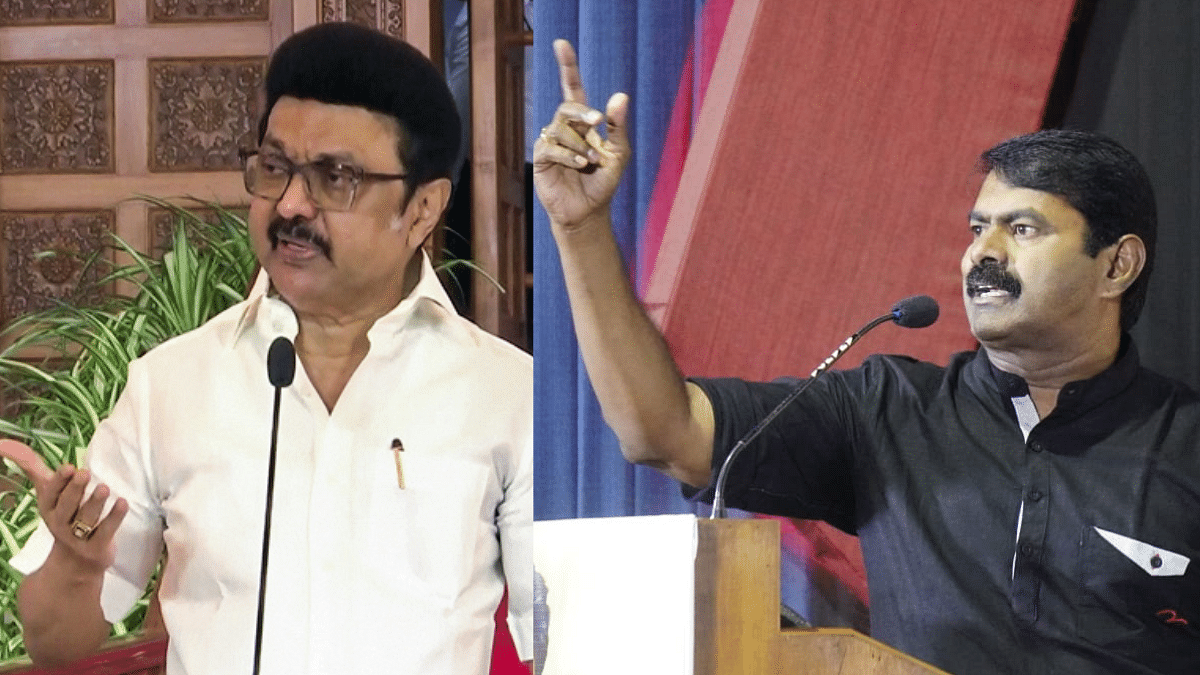Chennai: The omission of a stanza that used the word “Dravidam” when the Tamil Nadu state anthem was played at a Doordarshan Tamil event has turned into a debate over language and identity.
The issue erupted after the ruling Dravida Munnetra Kazhagam (DMK) first alleged that the omission, at the Friday event in Chennai that was presided over by Tamil Nadu Governor RN Ravi, was an attempt to impose Hindi in the state.
While the event, held as part of the Hindi month celebrations, was itself a point of contention, DMK leader and Chief Minister M.K. Stalin alleged that the omission was an insult to the state. The DMK also called on the Union government to recall the governor.
DD Tamil later apologised for the “inadvertent mistake”.
On the other hand, the Naam Tamilar Katchi (NTK), which is popular among the state’s youth, has come out against the anthem entirely and, in turn, accused the DMK of appropriating the Tamil identity using Dravidianism.
On Monday, NTK leader Seeman said that, if he comes to power, he would replace the Tamil anthem—’Tamil Thai Vazhthu’, declared the state anthem by the Stalin government in 2021— with the Puducherry anthem, adding that there is no need for the word “Dravidam” in the state song. This invited a police complaint from the ruling DMK’s advocates’ wing for “disrespecting” the song.
“There is nothing called ‘Dravida Nadu’ (Dravidian land). By using the word ‘Dravidam’, the identity of Tamil is kept hidden. In Kerala, Malayalis are Malayalis. In Karnataka, they are Kannadigas. But in Tamil Nadu, Tamils are not Tamils, but Dravidars,” NTK functionary Idumbavanam Karthik told ThePrint, adding that the state doesn’t need a song that calls the people of the state “Dravidars”.
He said that, while the Dravidian ideology was a way to ensure social justice and women’s empowerment and uproot evil systems such as casteism and Brahminism, the state’s Dravidian parties, such as the DMK and All India Anna Dravida Munnetra Kazhagam (AIADMK), have used it for political gains and uprooting the Tamil identity.
“Tamils should be ruling Tamils, like how Malayalis are ruling Kerala,” he said. The state’s major opposition parties, including the Bharatiya Janata Party (BJP), have also targeted Stalin and his family multiple times over their alleged Telugu origin.
The word “Dravidian” comes from the Sanskrit dravida, which may have been derived ultimately from the word ‘Tamil’ but was used to denote a vaguely conceived geographical region in south India. It was British missionary and linguist Robert Caldwell, in his 1856 book A Comparative Grammar of the Dravidian or South Indian Family of Languages, who first used the term “Dravidian” for a family of languages unconnected to Sanskrit. It was subsequently popularised—and politicised.
The Justice Party, which marked the beginning of the Dravidian movement in Tamil Nadu, demanded a separate ‘Dravida Nadu’ in the first half of the 1900s. Though this initially referred to the Tamil-speaking region, the party later expanded it to include other regions in the south. In 1939, Periyar, the founder of the Self-Respect Movement, held the Dravida Nadu Conference, advocating for a separate, sovereign, and federal republic of ‘Dravida Nadu’.
Periyar’s movement, which sought to abolish the caste system, empower women, and promote rational thinking, held anti-Hindi agitations to counter the compulsory teaching of Hindi in the Madras Presidency. In 1944, the Justice Party was renamed the Dravidar Kazhagam as Dravidian politics rose to the forefront.
Maalan Narayanan, a political analyst, said Seeman is utilising the opportunity to expose the fact that former Chief Minister M. Karunanidhi, despite there being many songs that talk about Tamil culture, chose this particular song as the state anthem for political gains because it had ‘Dravidam’ in it.
“Seeman’s objection is to the word ‘Dravidam’,” he said. “‘Dravidam’, wherever it’s used—in ‘Tamil Thai Vazhthu’ or in the national anthem—refers to a region, not the Tamilians.”
ThePrint reached out to DMK spokesperson A. Saravanan through calls and messages. The copy will be updated based on his comments.
Also Read: Chettinad festival is already boasting results. Money, movie shoots & more conservation
First, a Tamil Vazhthu song and then the state anthem
Written for the play Manonmaniyam by Manonmaniyam P. Sundaranar in 1891, the song was declared the Tamil Thai (‘Mother Tamil’) greeting song in 1970 by then CM Karunanidhi, three years after the party grabbed power in the state from the Congress, marking the ascendancy of regional and Dravidian politics in the state.
While the full song in the play was much longer, the state picked a slightly tailored version lasting about one minute that praises the Tamil culture. The section also invokes pride in being born in “Dravida land” and south India.
In 2021, Stalin declared the song the state anthem, days after the Madras High Court issued an order saying that since it was a prayer song, it did not require attendees to stand when sung.
Through an order, the Tamil Nadu government made it mandatory to play the anthem at the beginning of events organised by public and educational institutions and directed everyone to stand while it was being sung.
“Karunanidhi chose this song at the request of a Tamil Sangam (gatherings of Tamil scholars) near Thanjavur. It’s praising Tamils, but Karunanidhi has chosen the song because it included the word ‘Dravidam’,” Narayanan said, noting that there are other songs praising the Tamil culture.
The anthem of the Union territory of Puducherry, written by poet Bharathidasan, and chosen by Seeman as an option to replace the current anthem, praises and prays to ‘Mother Tamil’.
(Edited by Sanya Mathur)
Also Read: From national Dalit-Adivasi conclaves to Maharashtra polls, VCK’s aspirations go beyond Tamil Nadu

